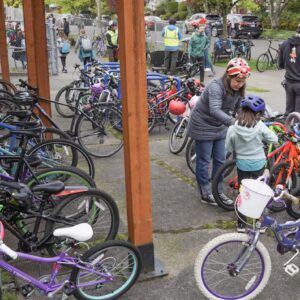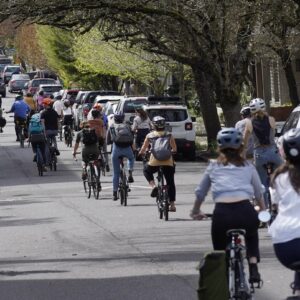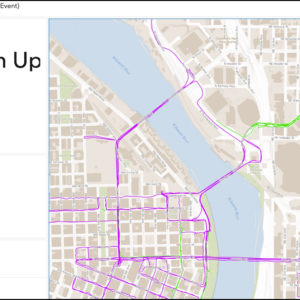A university based in Barcelona, Spain has released the first-ever report on bike bus efforts around the globe.
The report, from the City Lab Barcelona research group at Institut de Ciència i Tecnologia Ambientals de la Universitat Autònoma de Barcelona (ICTA-UAB), summarizes key findings from interviews with 22 bike bus leaders in eight countries.
Bike buses took off in 2021 when a Barcelona effort went viral online. But, according to this new report, the organized bike bus took place in Brecht, Belgium in 1998. “Today, Bike Bus has evolved from a set of isolated initiatives into a global movement that aspires to influence city policy and participate in the global conversation about building child-friendly cities.”
The takeaway I found most notable is that for most bike bus leaders, riding bikes to school together is just the vehicle that allows them to push for larger, more systemic changes to the transportation and road safety system. 94% of the 145 survey respondents said the bike bus is a form of activism. This tracks with sentiments we often hear from new parents, who become radicalized around bike activism after riding on streets with their kids and experiencing first-hand how stressful it can be.
The survey also found that without riding together as a group, just 10% of survey respondents said they’d feel safe biking to school because of inadequate infrastructure. That figure might also explain why 37% of bike bus participants are parents who ride with their kids.
On a related note, the survey found that the average age of bike bus riders is 8 years old, that the average size is 17 (10 children, seven adults), and the typical route is less than two miles.
While researchers counted over 470 bike buses worldwide that transport approximately 32,000 children to school per week (numbers that are likely even higher), they also noted red flags in the long-term viability of the movement. Currently the efforts are organized and funded by individual leaders (like parents and teachers). That’s enough to start and build a bike bus, but if they are to become institutionalized parts of school transportation, they must find more stable funding and organizational capacity.
That last finding validates the successful passage of statewide legislation in Oregon last year that will help enshrine government support. On the flip side, more government support — and the political strings attached to it — might reduce advocacy potential. One way to balance things out, researchers found, is to make sure parents and cycling activist groups stay involved.
This is the first significant piece of bike bus research we’ve come across, but it surely won’t be the last. We’re looking forward to the U.S.-based bike bus research project currently in progress from Portland State University’s Transportation Research and Education Center (TREC).
— Download the report here. Links for more information: BikeBusSummit.org, BikeBus.world, BiciBus.cat, BiciBus.eu, BikeBusPDX.org.









Thanks for reading.
BikePortland has served this community with independent community journalism since 2005. We rely on subscriptions from readers like you to survive. Your financial support is vital in keeping this valuable resource alive and well.
Please subscribe today to strengthen and expand our work.
Three whole years to wait for the report! I’m glad TREC has taken this up.
this is such an unnecessary comment. I mean, really, why even make the effort to type it?
Thanks for covering this Jonathan!!
Bike buses are cool. Wish we could have them in my blue collar neighborhood of East Portland, not just the privileged leafy neighborhoods. My kids would love to do it.
Start one, or help the school start one. PCEF is awarding grants for this type of organizing, especially in that it complements their e-bike rebate program.
You can do it if you find an organizer! Portland’s bike buses are run wholly by volunteers.
Hi Martina, we started the region’s first bike buses in 2003-2004 (BTA), but far east side schools and towns were mostly too worried about crime and dangerous roadways to participate. We were able to get one or two schools out east, but the rest said it was too dangerous. West and inner-east side schools had better infrastructure for biking – still do for the most part except in the hills.
Just got an email from a school near 122nd and Burnside I believe. Bike Portland has a great article about starting one. But sharing videos and finding other people who are interested is a great place to start.